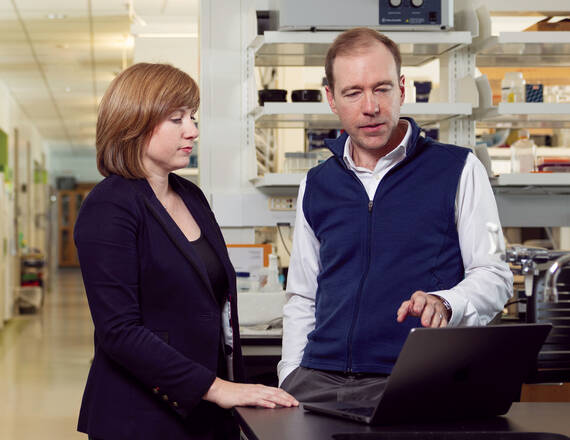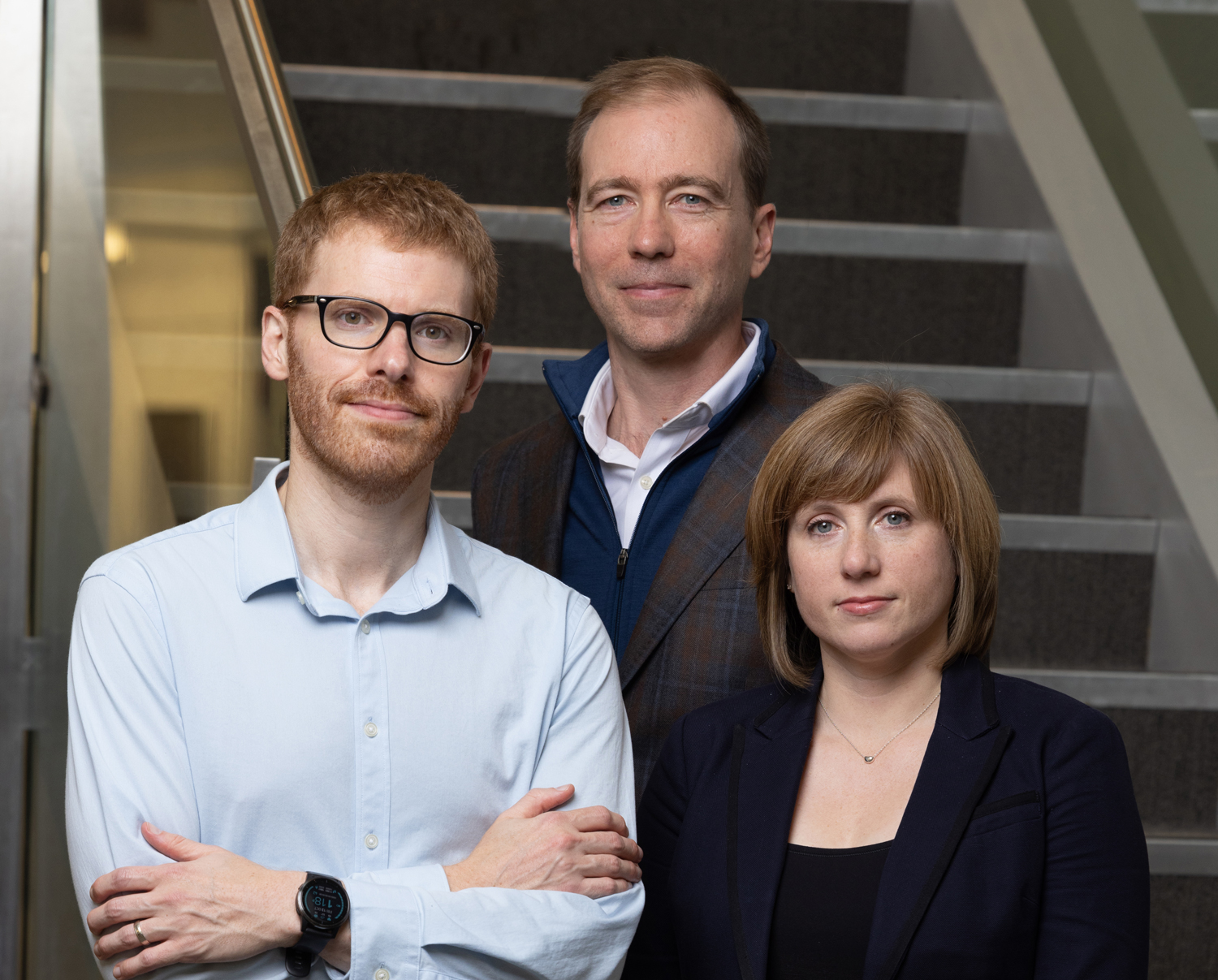A Personalized Healthcare Revolution
A healthcare revolution is underway—and innovators at Dartmouth Health and Geisel School of Medicine are leading the charge, harnessing artificial intelligence (AI) to deliver large-scale personalized precision medicine and prevention.
Across several initiatives, researchers at the medical school and the academic medical center are leaving one-size-fits-all approaches in the past and instead are building digital health tools to educate and empower patients—specifically tailored to their unique health needs.
Personalized care used to come only from direct human-to-human interactions, but with Dartmouth scientists leveraging artificial intelligence and machine-learning capabilities, the future of healthcare promises to feature customization that extends beyond the physical walls of a doctor’s office.

An Immune Profile Just for You
When it comes to cancer, patients often have highly specific risk profiles that can influence how they respond to treatment. A research team at Dartmouth Cancer Center is working to build technology that can identify those unique immune profiles for individual cancer patients. This patient-specific information could lead to more targeted clinical interventions and precision prevention.
“Many new drugs are in development in the cancer immunotherapy space, so we think there’s opportunity with our immune profiling approach to develop biomarkers of response and also identify new opportunities to modulate the immune system for patients who have cancer or other diseases,” says Brock Christensen, PhD, professor of epidemiology and of molecular and systems biology at Dartmouth, and co-leader of the Cancer Population Sciences Research Program at Dartmouth Cancer Center. Christensen works alongside co-investigator Lucas Salas, MD, PhD, professor of epidemiology, and others at Dartmouth.
In collaboration with researchers at Brown University and Dana–Farber Cancer Institute, Christensen and his team are leading an effort to study immunotherapy response in patients at the Dartmouth Cancer Center and other sites throughout the nation. Using machine-learning technology, the team analyzes a participant’s DNA to identify the person’s specific epigenetic profile. This patient-specific profile can reveal how the environment and other factors change the way the person’s genes are expressed and the direct impact on their immune system.
The goal is to understand why some people respond well to certain immunotherapy treatments and why others do not, and to leverage that information to improve patient outcomes. “We hope this technology will help identify individuals who are most likely to respond to new drugs during clinical trials,” Christensen says.
Learning which patients are most likely to benefit from new therapies during clinical trials may help physicians and patients identify the best treatment option and help more new therapies gain FDA approval—leaving behind the one-size-fits-all method of drug trials and treatments. Ideally, this new technology will reduce the time patients waste on treatments that will not work for them.
He also hopes to use the technology for precision prevention approaches, such as cancer interception. People at high risk for certain cancers could be put on therapies to intercept early signs of disease, before cancer develops, Christensen explains.
“We’re also hopeful that as new therapies emerge, our technology will be able to help physicians choose the right immunomodulatory therapy for patients,” he says.

Demystifying Mammography
Using mammography to screen for breast cancer has been proven to yield vastly improved treatment outcomes, enabling intervention early in the cancer’s development. However, many people don’t know what a mammogram is or what to expect when getting one.
This lack of awareness about the benefits, coupled with concerns about possible risks, can lead some to avoid mammography, says Christine Gunn, MA, PhD, assistant professor of The Dartmouth Institute for Health Policy and Clinical Practice and the health equity liaison to the Community Outreach and Engagement Program of the Dartmouth Cancer Center.
To empower patients, Gunn and her team have built a breast cancer screening decision aid, with funding from the National Cancer Institute, that helps people assess their risk of developing breast cancer within the next five years. The tool also supports awareness and decision-making for what to expect before, during, and after a mammogram. The tool, which presents information in an easy-to-understand format, prioritizes accessibility to ensure that people of all levels of health literacy will come away with a clear understanding of mammography.
“The goal of this tool is to help support decisions when people are thinking about getting regular mammography,” Gunn says. “People can identify their cancer risk, learn about the process of getting a mammogram, and know what to expect about the possible outcomes. For example, if someone gets called back for more images, they don’t have to be scared, because they don’t necessarily have cancer.”
Because the tool is available anytime, people can assess their breast cancer risk and learn about mammography before a visit with their primary care physician. With this information, they can be prepared with questions for their doctor and have a more productive conversation.
“The person wants to know what’s going to happen to them during the mammogram, but the doctor might not take time to walk them through the process,” Gunn says. “This tool does that.”
The tool also supports people after the mammogram, Gunn says. “They’ll have the mammogram, but there’s often no follow up with their doctor. They’ll just get the report, but some things are prone to misinterpretation. This tool helps explain what results are possible.”
Early results from users have been positive so far, and Gunn plans to continue testing the tool with a large randomized controlled trial. She also is studying how to add additional personalized risk assessments to the tool, such as environmental risk factors. “This tool is tailored to support the right person at the right time based on their information.”
A Therapist In Your Pocket
What if you could chat with a clinically validated therapist immediately, any time of day or night, the moment you begin to experience symptoms of depression or anxiety—or even before?
That’s the tool envisioned and cultivated by Nick Jacobson, PhD, assistant professor of biomedical data science and psychiatry within the Center for Technology and Behavioral Health. His research focuses on measuring and predicting symptoms of depression and anxiety throughout a person’s daily life. With this information, he has been able to develop apps for smartphones and smartwatches to analyze behaviors and alert users to physiological patterns that could lead to an increase in symptoms. His latest creation is a therapy chatbot.
The historical diagnostic criteria for major depressive disorder and general anxiety disorders are experiencing multiple symptoms most of the day, nearly every day, for two weeks or longer. But new research has found that there’s ebb and flow of symptoms each day, which opens up potential for in-the-moment treatment for these disorders.
“We can use that information in the treatment realm to give folks feedback on what they can do—a ‘knowledge is power’ model,” says Jacobson, who developed an app called Mood Triggers to do this. “If you know more about yourself, you have more opportunity to reduce symptoms on your own.” Jacobson is working on updates to the app to improve its efficacy.
His latest project is beginning a randomized controlled clinical trial to study the efficacy and safety of an AI chatbot called Therabot. This dynamic chat interface, he says, shows great promise in offering personalized therapeutic messages generated specifically to address input from the user. Jacobson’s lab has spent four years refining the technology, and now the chat can provide clinical gold-standard responses to user input, the same responses that a clinician might provide.
To ensure safety and efficacy throughout the trial, his team will monitor the bot’s responses and intervene with a human response if any answers are not optimal for a user’s health. “We are continually assessing high-risk cases, like suicide or substance use,” he says. “There’s a lot of promise in this area, and we are very excited about it.”
Past as Prologue to the Future of Medicine
Scientists at Dartmouth have long been at the forefront of the digital health revolution. In fact, the first AI summit was held at Dartmouth in 1956. Today, Dartmouth researchers are building on that foundation to usher in a new chapter in personalized healthcare, setting the stage for even more improvements in quality of life—possibly even lifesaving outcomes—in everyday medicine.
Lifesaving advancements at the intersection of technology and health require investments in research to push the boundaries of what is possible. Philanthropy will ensure that there are current and future funds to keep pace with the rapidly evolving digital healthcare landscape. To learn more, contact Erin Shreve at Erin.Shreve@hitchcock.org or 603-646-5878.

